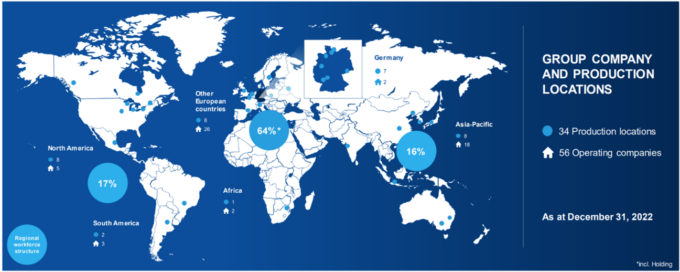
How to harness the power of nonmarket strategy
Forward-thinking leaders proactively shape their external environment, turn uncertainty into certainty, and create substantial value in the process....
Audio available

by Rouven Acquaviva Published August 2, 2024 in Strategy • 7 min read
FUCHS SE has established itself as a significant international player in the specialized field of lubricants and functional fluids. This German multinational, with its global reach and diverse product range, has become an essential partner to industries worldwide. As the company navigates the complex terrain of the Chinese market, however, it meets a challenge familiar to many international firms: how to balance global strategy with local agility.
Their experience in China offers a compelling study of corporate adaptation. It’s a narrative of German precision meets Chinese dynamism, of global ambitions intersecting with local realities. As the company rolls out its FUCHS2025 strategy, it’s not just refining its product line, it’s recalibrating its entire organizational approach to bridge continents and cultures.
At the core of this story lies a crucial question: in an era of global integration, how can a multinational corporation harness the energy of its most ambitious local teams without losing strategic coherence? The answer, it seems, lies in a delicate balance of autonomy and alignment – a formula that FUCHS is still fine-tuning in the world’s second-largest economy.

FUCHS SE, headquartered in Mannheim, Germany, specializes in high-efficiency lubricants and functional fluids. By the end of 2023, it was generating annual revenues of €3.5bn, with 75% international. FUCHS offers over 10,000 products across various downstream segments, making it a global full-line provider of lubrication solutions that enhance manufacturing processes and reduce wear and friction. With 56 subsidiaries and 11 equity-consolidated companies in three geographical regions: EMEA, Asia-Pacific, and North and South America, FUCHS usually manages its business through local subsidiaries and regional managers, blending global solutions with local market specifics.
FUCHS’ strategic evolution in China offers valuable insights into balancing global ambitions with local market dynamics, exemplifying the delicate balance between global aspirations and local market nuances. The core of this story is the FUCHS2025 strategy, a master plan that aligns global operations with local strengths, reflected in its six strategic pillars.

The Robust and Integrated Supply Chain Excellence (RISE) global project is a critical component of FUCHS2025. This project underscores FUCHS’ commitment to align global initiatives with local market needs, particularly in China. The initiative’s focus on digitalizing manufacturing processes saw FUCHS China pioneering the implementation of a Manufacturing Execution System (MES) solution from Siemens.
This endeavor in China is not just about adopting new technology but about redefining operational approaches. The Chinese team’s role in this transformation is central – they are not only implementing the MES solution but also critically evaluating its effectiveness against globally defined requirements. Their feedback will be instrumental in shaping a comprehensive global rollout plan, ensuring that the solutions adopted are not only locally effective but also globally scalable and compatible.
This approach marks a significant departure from previous practices, where local decisions often occurred in isolation, potentially leading to fragmented systems across different regions. By contrast, the RISE project in China exemplifies a new model of decision-making within FUCHS – one that combines local insights within a global strategic framework. This ensures that the solutions developed are not only responsive to local needs but also align with the company’s broader strategic objectives.
FUCHS entered the Chinese market in 1988, as one of the first international lubricant companies in China. With a traditionally dominant position in the Chinese automotive OEM market, boasting over a 20% market share, FUCHS China serves top automotive manufacturers like SAIC Volkswagen, Beijing Benz, Geely Group, and BYD, providing a diverse range of products. In 2019, FUCHS China marked a new chapter with the launch of its state-of-the-art factory in Suzhou, reflecting its rapid growth and its commitment to meeting the increasing and specific demands of the Chinese market. FUCHS China stands as one of the three largest markets in the FUCHS group, and its performance is a significant element of the company’s overall success and makes a significant contribution to its profits.

Zhu Qingping, CEO of FUCHS China, a seasoned professional with over 30 years of experience in the automotive industry faces a hypercompetitive market. In China, the lubricant market comprises a thousand companies, other multinational companies (MNCs), state-owned enterprises, and new private sector entrants. Sitting on the group management committee, Zhu has always been part of the development of FUCHS2025, an involvement that also guaranteed a deep understanding of the global perspective. Under Zhu’s leadership, FUCHS China has maintained a three-year rolling business strategy for the Chinese market which was tailored to the specific needs and opportunities within China, up until the formation of the global strategy office in 2019.
The integration with the global strategy office marked a significant shift, enhancing the professional approach to strategy formulation and aligning with the broader corporate direction. He emphasized a shift in the operational mindset: “We are rebranding the organization from FUCHS China to FUCHS in China.”
It will be a transition from merely receiving support from the headquarters to contributing actively to the global FUCHS network.
On one hand, China’s role as a pilot launch site for innovation, capitalizing on the rapid decision-making and flexibility of Chinese customers is very valuable. The willingness of FUCHS China to be the testbed for new products and initiatives underscores their commitment to being at the forefront of innovation within the group.
On the other hand, with Chinese enterprises like BYD and Goldwind Technologies expanding globally, this presents opportunities for FUCHS China to support and facilitate these global ventures. This includes aiding in certifications and business development, thus enabling other FUCHS entities to capitalize on these efforts.
As Zhu indicated: “Our mission in China is to make a greater contribution to global operations, which involves two key aspects: one is integration, and the second is to contribute more to the global scale.”

However, there remain some challenges. One of them is the exceptional drive and ambition of the Chinese team. “They’re extremely ambitious and eager, they want to develop further… they are like front runners,” said Stefan Fuchs, Chairman of the Executive Board and CEO of FUCHS.
However, the ambition has led to enthusiastic adoption and, at times, potentially an overextension of new initiatives. For instance, the Chinese team ambitiously took on about 30 segments, which may lead to a need to refocus and reprioritize. Another aspect of this challenge is managing the unbalanced pace between the holding and China, as the “China speed” sometimes leads to local solutions that may later need revisions to fit into the global game plan.
Five key takeaways for other businesses considering a China approach within a global strategy:
FUCHS China’s journey under FUCHS2025 is a compelling example of how a local subsidiary can not only adapt to global strategies but also drive them. From digital transformation in manufacturing to strategic HR development, FUCHS China demonstrates the power of local expertise in shaping a global narrative.
These lessons underscore the importance of viewing the Chinese market not just as a growth opportunity, but as a strategic partner in global operations and innovation.

Vice President of Corporate Strategy & Innovation at FUCHS SE
Rouven Acquaviva serves as the Vice President of Corporate Strategy & Innovation at FUCHS SE. He holds a bachelor’s degree in Business Administration and a Master’s degree in Finance. Rouven started his career with FUCHS in 2014 as Regional Controller for Southeast Asia and was based in Singapore before he moved back to Germany in 2017 where he took over the group‘s Internal Audit department. In 2019 he was tasked with setting up the corporate strategy department at FUCHS from scratch and was responsible for the development of the first global strategy at FUCHS (FUCHS2025). He is currently in charge of the group’s corporate strategy development, strategic portfolio management, corporate innovation and M&A & start-up scouting.

June 26, 2025 • by Michael Yaziji in Strategy
Forward-thinking leaders proactively shape their external environment, turn uncertainty into certainty, and create substantial value in the process....
 Audio available
Audio available
June 4, 2025 • by Stéphane J. G. Girod, David Branch in Strategy
The traditional e-commerce model is on its last legs. In a disrupted luxury landscape, brand leaders are shifting focus to unified commerce, hyper-personalization, and deeper digital storytelling to completely reinvent the customer...

June 3, 2025 • by Anna Cajot in Strategy
Donald Trump’s tariff tactics offer a bold case study in game theory in negotiations. By setting the rules early, limiting options, and projecting power through credible threats, his approach shows how negotiations...

May 27, 2025 • by Robert Earle, Karl Schmedders in Strategy
With solar power flooding grids, the duck curve creates both challenges and opportunities for businesses. Learn how smart companies can harness this shift to cut costs and boost efficiency....
Explore first person business intelligence from top minds curated for a global executive audience